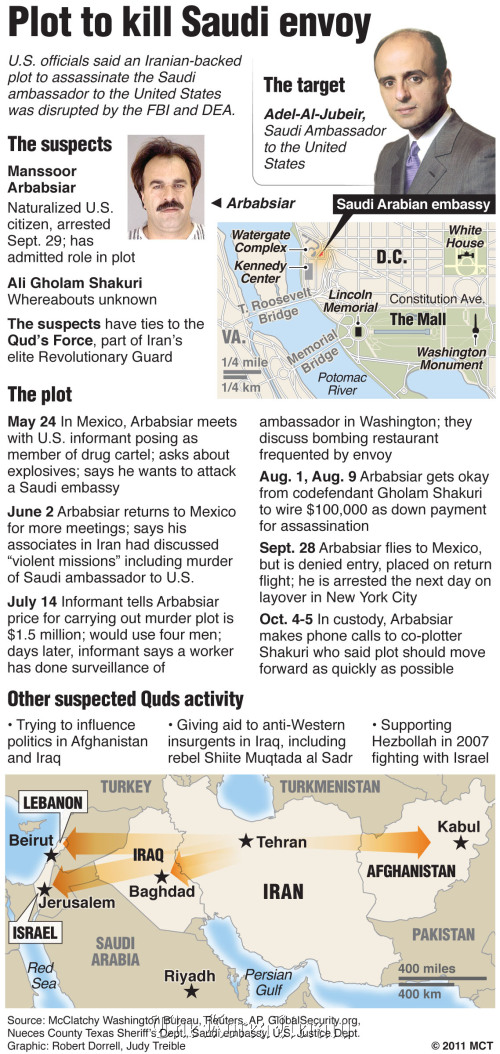Washington likely to use case as leverage to urge countries to sanction Tehran
WASHINGTON (AP) ― The Obama administration accused Iranian government agents Tuesday of plotting to assassinate the Saudi ambassador in the United States and immediately used the thwarted plot to ratchet up sanctions and recruit international allies to try to further isolate Tehran.
Two men, including a member of Iran’s special foreign actions unit known as the Quds Force, were charged in New York federal court with conspiring to kill the Saudi diplomat, Adel Al-Jubeir. Justice Department officials say the men tried to hire a purported member of a Mexican drug cartel to carry out the assassination with a bomb attack while Al-Jubeir dined at his favorite restaurant.
“The idea that they would attempt to go to a Mexican drug cartel to solicit murder-for-hire to kill the Saudi ambassador, nobody could make that up, right?” Secretary of State Hillary Rodham Clinton said in an interview with the Associated Press.
Clinton was blunt in saying the United States would use the case as leverage with other countries that have been reluctant to apply harsh sanctions or penalties against Iran. Clinton said she and President Barack Obama called world leaders to tell them of the developments.
“This really, in the minds of many diplomats and government officials, crosses a line that Iran needs to be held to account for,” Clinton said. She said she and Obama want to “enlist more countries in working together against what is becoming a clearer and clearer threat” from Iran.
The U.S. criminal complaint said the Iranian plotters hired a would-be assassin in Mexico who was a paid informant for the U.S. Drug Enforcement Administration and told U.S. authorities all about their plot, which they code-named “Chevrolet.”
FBI Director Robert Mueller said many lives could have been lost. But Preet Bharara, the U.S. attorney in Manhattan, said no explosives were actually placed and no one was in any danger because of the informant’s cooperation with authorities.
Attorney General Eric Holder, appearing at a news conference with Mueller and Bharara, declared, “The United States is committed to holding Iran responsible for its actions.”
Shortly afterward, the Treasury Department announced economic penalties against Arbabsiar and four Quds Force officers it says were involved.
Asked whether the plot was blessed by the very top echelons of the Iranian government, Holder said the Justice Department was not making that accusation. But he said the conspiracy was conceived, sponsored and directed from Tehran. The U.S. describes the Quds Force as Iran’s primary foreign action arm for supporting terrorists and extremists around the world.
The White House said Obama told al-Jubeir in a phone call that the foiled plot to assassinate him is a “flagrant” violation of U.S. and international law. Obama also told al-Jubeir he is committed to ensuring the security of diplomats in the United States, the White House said, and met with his national security team to thank them for disrupting the plot.
The Obama administration has often said that no option is off the table with Iran, a position that a U.S. official said had not changed Tuesday. But the official, who spoke on condition of anonymity because he was not authorized to discuss the policy publicly, said the emphasis now is on increasing diplomatic and economic pressure on Iran.
The alleged target was Al-Jubeir, a commoner educated at University of North Texas and Georgetown who was foreign affairs adviser to Saudi King Abdullah when he was crown prince. A month after the 2001 attacks, in which 15 of the 19 Arab hijackers were from Saudi Arabia, Abdullah sent al-Jubeir to the United States to rebuild Saudi Arabia’s image in the United States. He was appointed ambassador in 2007.
Shiite Iran and Sunni Saudi Arabia are the Mideast’s two most powerful countries and have long vied for power and influence across the region. Saudi Arabia and other countries like Bahrain have accused Iran of trying to create dissent in their countries this year, during democracy movements across the region.
The Saudi Embassy said in a statement that it appreciated the U.S. efforts to prevent the crime. “The attempted plot is a despicable violation of international norms, standards and conventions and is not in accord with the principles of humanity,” the statement read.
Manssor Arbabsiar, a 56-year-old U.S. citizen who also holds an Iranian passport, was charged along with Gholam Shakuri, who authorities said was a Quds Force member and is still at large in Iran. The Treasury Department listed addresses for Arbabsiar in two Texas cities ― the Austin suburb of Round Rock and the Gulf city of Corpus Christi ― and prosecutors say he frequently traveled to Mexico for business.
The complaint filed in federal court says Arbabsiar confessed that his cousin Abdul Reza Shahlai was a high-ranking member of the Quds Force who told him to hire someone in the narcotics business to target Al-Jubeir. U.S. authorities described Shakuri as Shahlai’s deputy who helped provide funding for the plot. Shahlai was identified by the Treasury Department in 2008, during George W. Bush’s administration, as a Quds deputy commander who planned the Jan. 20, 2007, attack in Karbala, Iraq, that killed five American soldiers and wounded three others.
Arbabsiar, Shakuri and Shahlai and two others ― Qasem Soleimani, a Quds commander who allegedly oversaw the plot, and Hamed Abdollahi, a senior Quds officer who helped coordinate ― were sanctioned Tuesday by the Treasury Department for their alleged involvement. The department described all except Arbabsiar as Quds officers.









